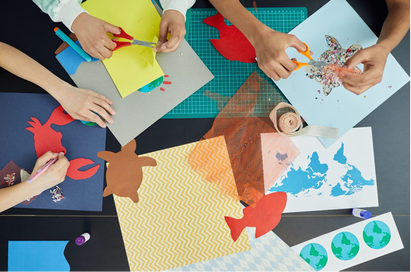Helping Children With Disabilities Thrive With Creative Arts
Image via Pexels
Helping Children With Disabilities Thrive With Creative Arts
The world is full of creative energy, encapsulating music, movement, dance, and visual arts. Participating in creative arts gives children the freedom and opportunity to express their feelings and creates a safe space to develop their strengths, overcome their fears, and build their self-esteem.
Getting Started
Adapting to and supporting your child’s needs is the first step to getting them involved in the creative arts. According to Noodle, children with disabilities facing specific cognitive barriers might display stronger visual skills than academic skills, making visual arts an area where they can excel. However, aligning the activity with your child’s natural interests and abilities is important. It’s advisable to arrange a trial lesson or assessment before moving forward.
Music and Rhythm
Josh Ross, the owner of J-RO School of Music in Troy, Michigan, encourages parents to enroll their children in a free assessment lesson before deciding whether learning to play a musical instrument is the right activity for their child. Playing an instrument can improve concentration and reading skills and reduce anxiety and stress. It also develops coordination and creativity and promotes self-expression. Music engages all the senses, stimulating a greater understanding of self. It requires and teaches perseverance and discipline, which can help children better control their emotions.
Painting and Crafts
Children who are neurodivergent, through autism, dyslexia, and ADHD, for example, can communicate their thoughts and feelings through pictures to express themselves. If your child shows interest in painting and doing crafts, transforming an existing multipurpose room in your home into an art space can encourage them to be creative daily.
Not only will a dedicated space benefit your child, but it can also add value should you sell your property. Be sure to keep a file of receipts for improvements you make on hand and ready for the appraiser.
Music and Dance Therapy
All children benefit from dancing and movement. It strengthens muscles, builds confidence, alleviates stress, and teaches social interaction. Studies report that dance and movement are particularly effective for children with Down syndrome, as it strengthens the mind-body connection to improve developmental and cognitive skills. Many organizations and dance companies in Michigan offer movement programs for children with disabilities that focus on agility, balance, and motor skills.
Drama and Theater
According to the American Alliance for Theatre and Education, there is a strong correlation between drama activities and reading proficiency, motivation, and empathy. Acting also improves verbal and nonverbal communication skills and academic performance. Furthermore, it encourages and maintains a greater self-awareness and develops self-esteem.
Other Resources
the Cerebral Palsy Guide has compiled the most in-depth resources nationwide to help guide and serve all families with disabilities caused by physical birth injuries. Go to www.cerebralpalsyguide.com to learn more
Helping Your Child Thrive
There is no greater pleasure than seeing your child grow into a healthy, happy, able, and successful young adult. Exploring creative arts with your child and encouraging them to participate can boost their confidence and equip them with the skills to succeed in life.
The J-RO School of Music’s passionate team of music makers and teachers specializes in student-centric, results-based music education for children of all ages. Contact them today to schedule your free assessment.
